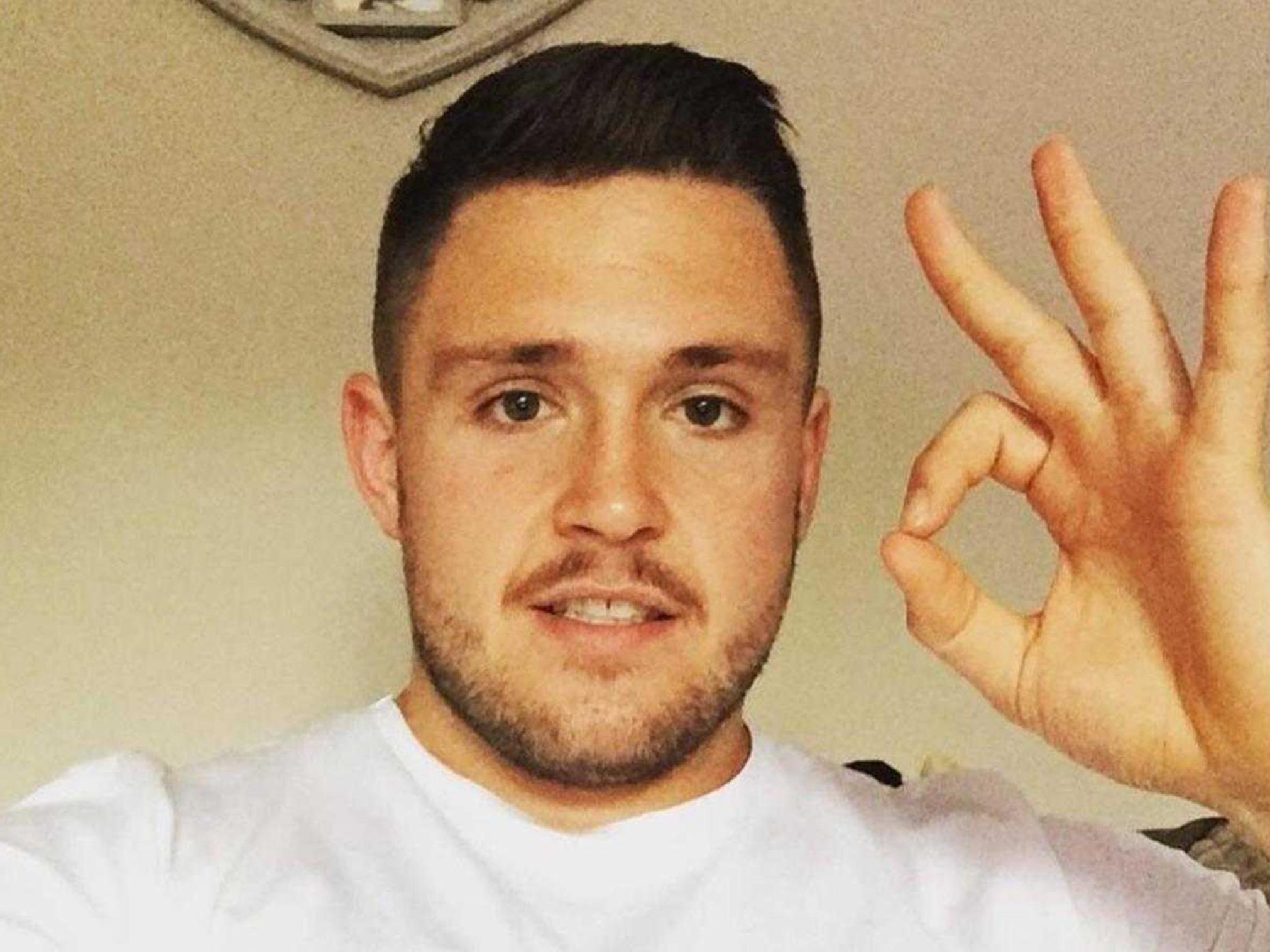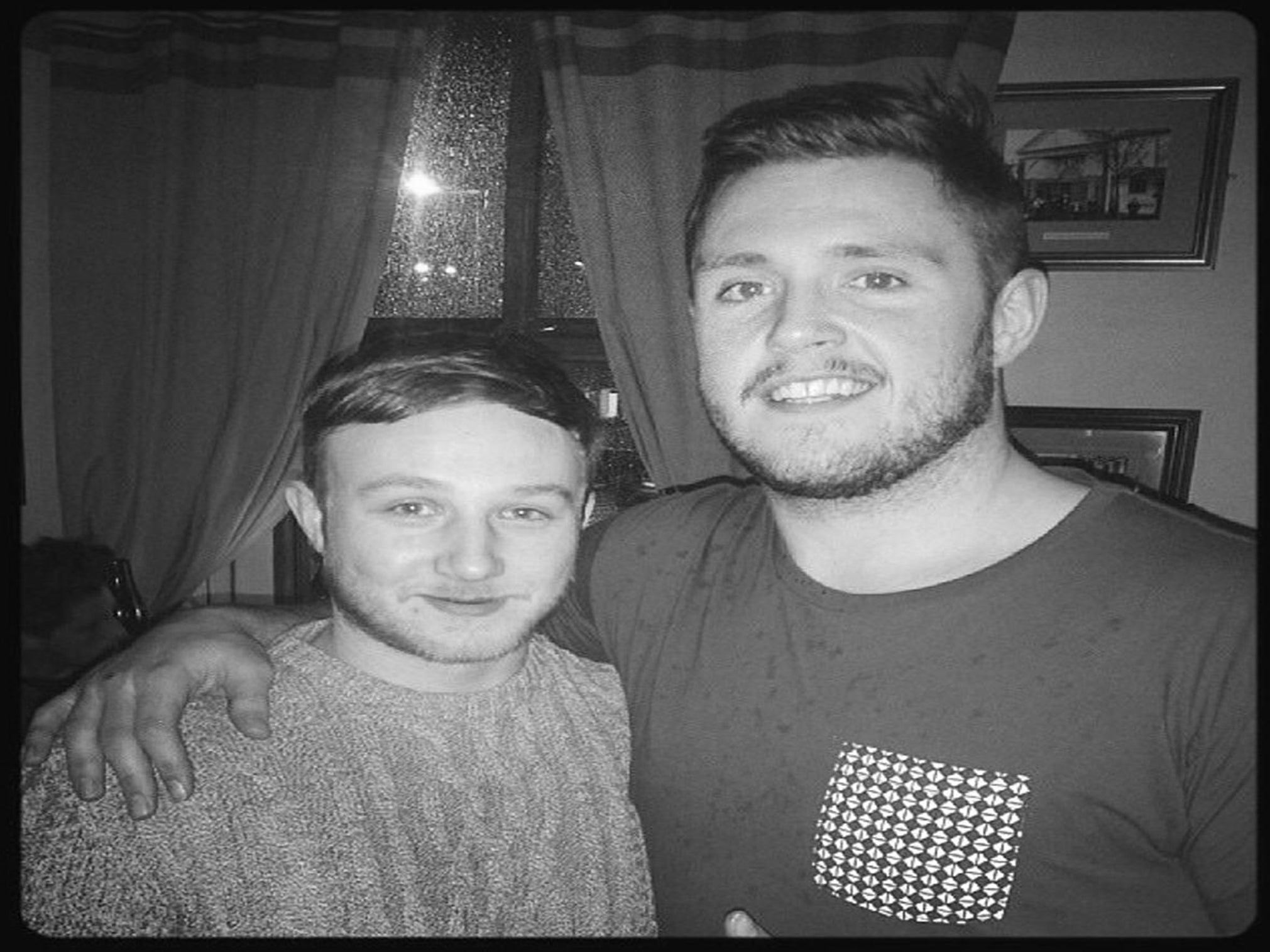Andy’s Man Club: A talking group fighting male suicide
Luke Ambler founded Andy’s Man Club after his brother-in-law’s suicide, and now he’s helping others open up about their feelings so that they don’t suffer the same fate. By David Barnett


The first rule of Andy’s Man Club is that you definitely do talk about Andy’s Man Club. Word of mouth is how this movement has grown from a small meeting in Halifax, West Yorkshire, to a Facebook support group with a community of more than 37,000 and a series of Monday night meetings across the North, which last week saw attendances rise to more than 430 people.
And the very raison d’etre of Andy’s Man Club is talking. It’s something men traditionally don’t do very well, especially about their feelings, especially about their troubles. And that is what has led to male suicide being the biggest killer of men under the age of 45 in the UK today. In the latest figures, men taking their own lives accounted for 75 per cent of all suicides, with almost 4,400 cases in 2017.
Andy’s Man Club is the brainchild of Luke Ambler of Halifax. Luke has played rugby league for his hometown; at Super League level for Salford City Reds and Leeds Rhinos; and in international competition for Ireland, by dint of his Irish ancestry.
Luke, 30, was in his car just a few days after his brother-in-law Andy Roberts took his own life in April 2016. And he was getting angry. “I just thought, this is bullshit,” says Luke. “Why didn’t he talk about what was bothering him? I was getting more and more pissed off. Then I started wondering what I could do about it.”
He spoke to his partner, Lisa – Andy’s sister – and their mum, Elaine, and they agreed that there should be more done to encourage men to open up about their feelings and troubles. Luke thought about some sort of safe space where men could talk, and the idea of Andy’s Man Club was born.
“It’s difficult for men to talk,” says Luke. “Men are used to solving other people’s problems, being the head of their family, being strong and there for everyone else. That’s the tradition. But society’s changing, which is a good thing. However, a lot of men don’t know how to open up about their troubles.”
Men are used to solving other people's problems, being the head of the family, and being strong. However, a lot of men don’t know how to open up about their troubles
A few weeks after Andy’s death, the inaugural meeting of Andy’s Man Club was organised, at Luke’s office in Halifax, from where he ran his post-rugby career training business. Luke put something on Facebook, and waited in a room with Elaine. They had no idea if anybody would bother turning up.
“I was sitting there with Elaine and we had no idea what would happen,” says Luke. “I was quite nervous, and I was kind of playing with this foam ball. Then nine people turned up. I still wasn’t sure what we were going to do, I had this idea that we might have to do some sport of something, to get everyone relaxed. Then this guy called Oliver, a real broad Yorkshireman, just said, ‘give us that ball, lad’.”
Oliver took the ball and spoke about his life, and losing his son, opening up in a way he’d never done before. Then he tossed the ball to another attendee, and told him it was his turn. And just like that, Andy’s Man Club began. Oliver now runs regular Monday night sessions.
A few weeks after the first meeting, Luke posted a selfie on social media, making the “OK” sign, thumb and forefinger curled together, other fingers straight, with the hashtag #ItsOkayToTalk. The image went viral, and suddenly people wanted to know what it meant, what Andy’s Man Club was. And when they found out, there was an appetite for what was happening in Halifax. There are now 17 Andy’s Man Club meetings, from Scotland to Devon and all along the M62 corridor from Lancashire to the east coast. By May, there will be 19 clubs.
What do men talk about at Andy’s Man Club? “Anything,” says Luke. “There can be all kinds of problems men are bottling up. Money worries, problems with their relationships, trouble at their job, or finding work. It’s a very wide spectrum.”
It perhaps sounds a bit touchy-feely, but it’s not. It’s men, sitting in a room, talking. But as well as talking about football or movies or whatever they’re into, they also talk about themselves, in a way they don’t feel encouraged to anywhere else.
If you were to attend an Andy’s Man Club meeting, you’d turn up at about 6.50pm. There’d be a couple of guys on the door of the venue, directing you inside, where you’d be greeted by the session leader, given a cup of tea, then you’d sit down in a circle of lads, and says Luke, “just talk. It’s a big thing coming through that door for a lot of men, but when they leave it’s the best thing they’ve ever done in their lives.”
It’s a bittersweet irony that had something like Andy’s Man Club existed three years ago, Luke’s brother-in-law and best friend Andy Roberts might still be here today. The date 3 April 2016 is forever burnt on Luke’s brain. The first he knew was when he took a call from Elaine, Andy’s mother. “She just told me that Andy was dead,” he recalls. “I had no idea how or why. I just set off as fast as I could.”

When he got to Elaine’s home, he got the awful news. Andy had taken his own life in some woods near his home. Andy had not given anyone any indication he was suicidal, and that’s entirely the point. Whatever problems he had, he internalised, bottled up. He wasn’t outwardly troubled or depressed. Nobody had any idea that there was anything so dreadfully wrong that he would take his own life at the age of 23.
“Andy was a bit of a bugger when he was younger, I suppose,” says Luke. “He’d been in prison. But he’d got away from this crowd he was hanging with, and I always knew him as the most polite, charming young man you could meet. He had a beautiful daughter, he was a top bloke. I was looking through our last messages the other day, and he was asking me about getting fit, he wanted to go into the army. He’d had relationship stuff going on, but the sort of thing that could have been sorted, was fixable, if he’d just talked to someone. It’s just madness.”
But the club that Andy gave his name to has helped others. It’s saved lives. Luke says: “It isn’t just one or two people who’ve said that. I get 10 or 12 people a week telling me that if it wasn’t for Andy’s Man Club, they’d literally be dead.”
I get 10 or 12 people a week telling me that if it wasn’t for Andy’s Man Club, they’d literally be dead
It’s a huge, positive achievement that’s come out of tragedy. Luke tries to get to as many meetings as he can, and says the feeling he gets from seeing men open up is “better than any rugby game I’ve ever played in. It’s such a buzz.”
A registered charity, Andy’s Man Club is staffed totally by volunteers, and the powerhouse that is Luke Ambler. As word spreads, more and more people want to attend, or to have sessions in their local town, which is something Luke is all for. “Basically,” he says, “we’re about prevention rather than cure.”
The battle to encourage men to open up is one being fought on several fronts. Last month, the Samaritans started their Real People, Real Stories campaign on the back of new research the charity commissioned which showed that 41 per cent of men aged between 20 and 59 in England, Scotland and Wales never seek support when they should, preferring instead to try to solve their own problems.

Paul McDonald, executive director of external affairs at Samaritans, said: “We didn’t want to create just another awareness campaign. We wanted something authentic and emotive from men who have been through tough times, sharing their really powerful, positive and hopeful stories to encourage other men to seek help before they reach crisis point.
“Our survey results found that although 78 per cent of men aged 20-59 say it’s okay to admit you’re not feeling okay, many still avoid speaking out when they’re finding life tough. A quarter felt their problems weren’t important enough to warrant calling a helpline, which is one of the reasons this awareness campaign is so important.
The list of things men don't talk about includes money, debt worries, relationship breakdowns, job-related stress and feelings of loneliness and isolation
Among the stories in the campaign is that of Tony Robertson, 38, who struggled with undiagnosed depression all his life. When life dealt him a series of blows that saw him lose his job, his home and his partner, Tony attempted to take his own life. Tony says: “I was in my hospital bed the morning after and I saw my mum sat there upset, and something clicked. I started talking to my mum about how I was feeling. I think having that human connection really does bring that home. Talking really can save lives.”
The list of things men don’t talk about, according to the Samaritans study, includes money and debt worries, relationship breakdowns and family problems, job-related stress or unemployment, and feelings of loneliness and isolation.
As with Andy Roberts, Ollie Mehra’s problems began when he was a teenager. He was just 15 when he started suffering with anxiety and depression. Now 23, he marks the point that his relationship broke down as “the straw that broke the camel’s back”.
When he began to have thoughts of taking his own life, Ollie finally confided in his friends. He recalls: “When I told my friends how I was feeling, four of them said, ‘Mate, so have I. I know how you feel.’ Instantly I thought to myself, right, I’m not the only one. It isn’t a weird thing. I should have got help sooner, we all should have talked about it sooner.”
Getting men to talk is the main factor in tackling what’s become known as the “silent epidemic” in male suicide. Writing for the British Psychological Society last year, Dr Funke Baffour noted: “It has been suggested that lower suicide rates among women is due to women being able to manage complex emotions, as well as having more flexible coping strategies than men. Also suggesting that men are socialised to internalise their feelings and this could inhibit them from reaching out for the help that they need.”
She said that it was time for the government to take a leading role in tackling the problem, adding: “There is an urgent need for the government to focus on reducing the rate of male suicide. It needs to be talked about it, understood and intervened. We need to refrain from simply maintaining the narrative that just because men are physically strong they must therefore avoid being seen as mentally weak.
“Suicide prevention strategies and plans should be geared to support men to build the skills in dealing with issues that they face. Telling men to get help doesn’t take us very far in dealing with male suicide. The causes of the driving factors should be identified, understood and addressed. We ought to dig deeper and take time to understand a very real problem facing the country.”
Luke Ambler can see that, but thinks there’s no point waiting around for someone else to do something. “I get asked the question a lot,” he says. “What should the government do about the problem? I always say that I’m not bothered about campaigning for this sort of thing because that would be where all the Andy’s Man Club energy goes, instead of helping people.
“We – and I mean all of us – have to focus on what we can do in our own communities. We have to be beacons of hope for other people. It can start with your own family. You might have a brother, a dad, a son, someone who’s got problems they’re not talking about. But if people open up, then that encourages others to open up.”
At Samaritans we understand the value of talking and the power of human connection. Just two people talking can really help that person to stop, breathe and start to see a way through their problems
Paul McDonald agrees. He says: “At Samaritans we understand the value of talking and the power of human connection. Just two people talking can really help that person to stop, breathe and start to see a way through their problems. Samaritans gives people the space to be themselves. We won’t judge or tell you what to do, we’re here to listen.”
Just as Luke Ambler knows only too well that men will often brush problems under the carpet and concentrate on what are perceived as more manly pursuits, such as football, the Samaritans has enlisted former Premier League footballer and professional boxer Leon McKenzie for its Real People, Real Stories campaign.
McKenzie revealed in 2011 that he had tried to take his own life, despite what many would see: a high-flying career with no money worries. But even that does not make someone immune to isolation and loneliness. McKenzie says: “I know how tough it gets when you’re in that dark place. I’ve been there, not wanting to exist anymore. By sharing my story and supporting the campaign, I hope other men understand that you can climb back up with some help.”
Anyone struggling with any of the issues raised in this story can contact the Samaritans 24 hours a day, seven days a week on 116 123, or visit Samaritans.org, where you can also read about the Real People, Real Stories campaign. Andy’s Man Club is on Facebook and has a website at andysmanclub.co.uk
Join our commenting forum
Join thought-provoking conversations, follow other Independent readers and see their replies
Comments
Bookmark popover
Removed from bookmarks